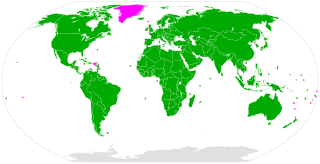| C153 | |
|---|---|
| ILO Convention | |
| Date of adoption | June 27, 1979 |
| Date in force | February 10, 1983 |
| Classification | Hours of Work |
| Subject | Working Time |
| Previous | Occupational Safety and Health (Dock Work) Convention, 1979 |
| Next | Collective Bargaining Convention, 1981 |
Hours of Work and Rest Periods (Road Transport) Convention, 1979 is an International Labour Organization Convention.
It was established in 1979, with the preamble stating:
Having decided upon the adoption of certain proposals with regard to hours of work and rest periods in road transport,...
The convention is a revision of ILO Convention C67, Hours of Work and Rest Periods (Road Transport) Convention, 1939 (shelved).
As of 2022, the convention has been ratified by nine states.
| Country | Date | Notes |
|---|---|---|
| Ecuador | 20 May 1988 | |
| Iraq | 17 April 1985 | |
| Mexico | 10 February 1982 | |
| Spain | 7 February 1985 | |
| Switzerland | 4 May 1981 | |
| Turkey | 17 March 2005 | |
| Ukraine | 9 June 2008 | |
| Uruguay | 19 June 1989 | |
| Bolivarian Republic of Venezuela | 5 July 1983 |

A rush hour or peak hour is a part of the day during which traffic congestion on roads and crowding on public transport is at its highest. Normally, this happens twice every weekday: once in the morning and once in the afternoon or evening, the times during which the most people commute. The term is often used for a period of peak congestion that may last for more than one hour.

A truck driver is a person who earns a living as the driver of a truck, which is commonly defined as a large goods vehicle (LGV) or heavy goods vehicle (HGV).

The Convention Concerning the Prohibition and Immediate Action for the Elimination of the Worst Forms of Child Labour, known in short as the Worst Forms of Child Labour Convention, was adopted by the International Labour Organization (ILO) in 1999 as ILO Convention No 182. It is one of eight ILO fundamental conventions.

The CMR Convention is a United Nations convention that was signed in Geneva on 19 May 1956. It relates to various legal issues concerning transportation of cargo by road. It has been ratified by the majority of European states. As of January 2022, it has been ratified by 58 states.

The Convention on Road Traffic, commonly known as the Vienna Convention on Road Traffic, is an international treaty designed to facilitate international road traffic and to increase road safety by establishing standard traffic rules among the contracting parties. The convention was agreed upon at the United Nations Economic and Social Council's Conference on Road Traffic and concluded in Vienna on 8 November 1968. It came into force on 21 May 1977. This conference also produced the Convention on Road Signs and Signals. The Convention had amendments on 3 September 1993 and 28 March 2006. There is a European Agreement supplementing the Convention on Road Traffic (1968), which was concluded in Geneva on 1 May 1971.
Weekly Rest (Industry) Convention, 1921 is an International Labour Organization Convention on limitation of working time to eight-hour day and 48 hours for a week.
The Convention concerning Wages, Hours of Work on Board Ship and Manning is a convention of the International Labour Organization originally drafted in 1946 and revised conventions in 1949 and 1958, none of which entered into force.
Hours of Work and Rest Periods Convention, 1939 (shelved) is an International Labour Organization Convention.
Hours of Work and Rest Periods Convention may refer to:

The Working Conditions Convention, 1991, officially the Convention concerning Working Conditions in Hotels, Restaurants and similar Establishments is an International Labour Organization Convention adopted in 1991 during the 78 International Labour Conference.

The Convention on Road Signs and Signals, commonly known as the Vienna Convention on Road Signs and Signals, is a multilateral treaty designed to increase road safety and aid international road traffic by standardising the signing system for road traffic in use internationally.
Drivers' working hours is the commonly used term for regulations that govern the activities of the drivers of commercial goods vehicles and passenger carrying vehicles. In the United States, they are known as hours of service.
Work in Fishing Convention (2007) C 188, was adopted at the 96th International Labour Conference (ILC) of the International Labour Organization ILO in 2007. The objectives of the Convention is to ensure that fishers have decent conditions of work on board fishing vessels with regard to minimum requirements for work on board; conditions of service; accommodation and food; occupational safety and health protection; medical care and social security. It applies to all fishers and fishing vessels engaged in commercial fishing operations. It supersedes the old Conventions relating to fishermen.
C67 or C-67 may refer to:
Multimodal transport is the transportation of goods under a single contract, but performed with at least two different modes of transport; the carrier is liable for the entire carriage, even though it is performed by several different modes of transport. The carrier does not have to possess all the means of transport, and in practice usually does not; the carriage is often performed by sub-carriers. The carrier responsible for the entire carriage is referred to as a multimodal transport operator, or MTO.

The kilometre per hour is a unit of speed, expressing the number of kilometres travelled in one hour.

The Maritime Labour Convention (MLC) is an International Labour Organization (ILO) convention, number 186, established in 2006 as the fourth pillar of international maritime law and embodies "all up-to-date standards of existing international maritime labour Conventions and Recommendations, as well as the fundamental principles to be found in other international labour Conventions". The other pillars are the SOLAS, STCW and MARPOL. The treaties applies to all ships entering the harbours of parties to the treaty, as well as to all ships flying the flag of state party.

The Convention on Domestic Workers, formally the Convention concerning Decent Work for Domestic Workers is a convention setting labour standards for domestic workers. It is the 189th ILO convention and was adopted during the 100th session of the International Labour Organization, in 16 June 2011. It entered into force on 5 September 2013.

European Convention for the Protection of Animals during International Transport refers to two animal welfare treaties regarding livestock transportation of the Council of Europe:
The right to sit refers to laws or policies granting workers the right to be granted suitable seating at the workplace. Jurisdictions that have enshrined "right to sit" laws or policies include the United Kingdom, Jamaica, South Africa, Eswatini, Tanzania, Uganda, Lesotho, Malaysia, Brazil, Israel, Ireland, the Indian states of Tamil Nadu and Kerala, the Canadian province of Newfoundland and Labrador, and the British overseas territory of Gibraltar and Montserrat. Almost all states of the United States and Australia, as well as the majority of Canadian provinces passed right to sit legislation for women workers between 1881 and 1917. US states with current right to sit legislation include California, Florida, Massachusetts, Montana, New Jersey, New Mexico, New York, Oregon, Pennsylvania, West Virginia, and Wisconsin. A right to sit provision is included in the International Labour Organization's Hygiene Convention, 1964; the convention being ratified by 51 countries as of 2014. Local jurisdictions with right to sit laws include Portland, Oregon, St. Louis, Missouri and London's Royal Borough of Kensington and Chelsea. Some jurisdictions, such as Alabama, Arkansas, Connecticut, Idaho, Kentucky, Maine, Michigan, Missouri, Nevada, New Hampshire, Quebec, and Washington, D.C. have revoked their right to sit laws. Many right to sit laws originally contained gendered language specifying women workers only. Some jurisdictions maintain gendered laws, but many jurisdictions have amended their right to sit laws to be gender neutral.